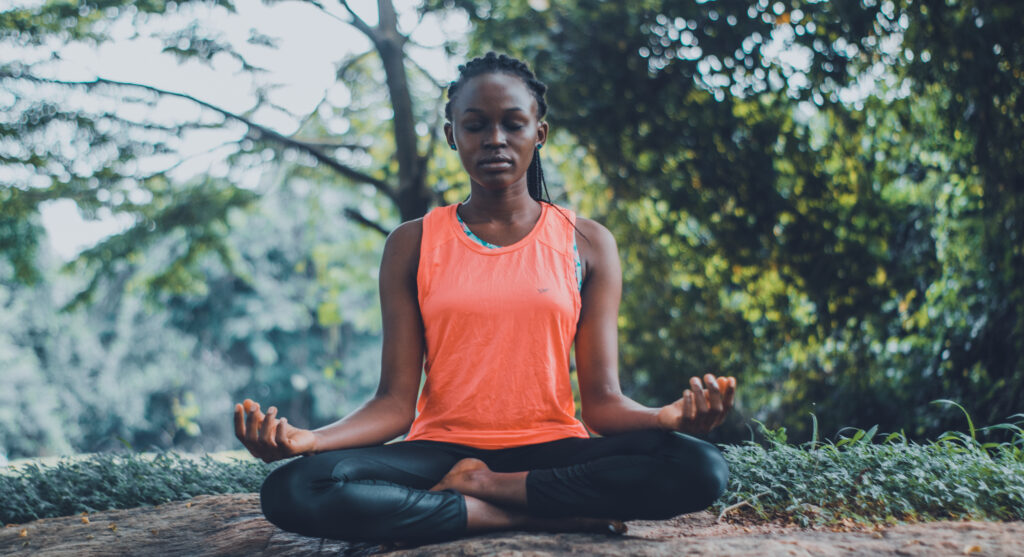Are negative thoughts and self-doubt getting the best of you? Fear not, for guided meditation is here to lend a helping hand. This ancient practice has been proven to be an effective tool in managing and even overcoming negativity and self-doubt. By utilizing guided meditation, you can learn to quiet your mind, gain a fresh perspective, and cultivate a more positive and confident outlook on life. So, if you’re ready to embark on a journey of self-discovery and personal growth, let guided meditation be your trusted companion.

This image is property of images.pexels.com.
Understanding Negative Thoughts and Self-doubt
Negative thoughts and self-doubt are common experiences that many people face in their daily lives. Whether caused by external factors or internal insecurities, these thoughts can hinder personal growth, damage self-esteem, and impact overall well-being. It is important to understand the nature of negative thoughts and self-doubt in order to effectively manage them. Negative thoughts often arise from a cognitive belief system that focuses on the worst-case scenarios or magnifies personal flaws. Self-doubt, on the other hand, stems from a lack of confidence in one’s abilities or worthiness.
The Role of Guided Meditation in Managing Negative Thoughts and Self-doubt
Guided meditation has emerged as a powerful tool in managing negative thoughts and self-doubt. By incorporating mindfulness and relaxation techniques, guided meditation helps individuals develop a positive mindset, enhance self-awareness, and cultivate emotional balance. The beauty of guided meditation lies in its ability to provide gentle guidance and support, making it accessible for individuals of all levels of meditation experience.
Reducing Stress and Anxiety
Stress and anxiety can significantly contribute to the presence of negative thoughts and self-doubt. Guided meditation offers a methodical approach to manage these emotions, providing a safe space to explore and address their underlying causes. By focusing on breath awareness and body relaxation, guided meditation helps to activate the body’s relaxation response, reducing the production of stress hormones and promoting a sense of calmness and inner peace. As a result, negative thoughts and self-doubt are alleviated, allowing individuals to approach challenges with a clearer and more rational mindset.
Enhancing Self-awareness
Self-awareness is an essential component in understanding and managing negative thoughts and self-doubt. Guided meditation encourages individuals to bring attention to their thoughts, feelings, and physical sensations without judgment. Through mindfulness practices, one can observe negative thoughts and self-doubt as passing mental events rather than an accurate reflection of reality. By developing self-awareness, individuals gain a deeper understanding of the factors that trigger negative thoughts and self-doubt, allowing them to consciously choose more adaptive responses.
Cultivating a Positive Mindset
A positive mindset is crucial when it comes to managing negative thoughts and self-doubt. Guided meditation helps individuals shift their focus from negative to positive by encouraging the development of positive affirmations and gratitude. By repeating positive statements and acknowledging the things they are grateful for, individuals can reprogram their thought patterns and reinforce positive beliefs about themselves. Cultivating a positive mindset helps individuals combat negative thoughts and self-doubt, promoting self-confidence and self-acceptance.
Developing Cognitive Flexibility and Resilience
Negative thoughts and self-doubt often result from rigid thinking patterns or an inability to adapt to changing circumstances. Guided meditation promotes cognitive flexibility by guiding individuals through visualization and perspective-shifting exercises. By encouraging individuals to imagine different possibilities and challenge their negative beliefs, guided meditation helps broaden their perspectives and develop resilience. This mental agility allows individuals to reframe negative thoughts, find alternative solutions, and bounce back from setbacks with greater ease.
Specific Techniques Used in Guided Meditation
Guided meditation employs a variety of techniques to address negative thoughts and self-doubt. These techniques can be practiced individually or in combination depending on personal preference and specific needs.
Deep Breathing Exercises
Deep breathing exercises form the foundation of many guided meditation practices. By focusing on the breath, individuals can anchor their attention to the present moment and calm their minds. Deep, slow breaths activate the parasympathetic nervous system, triggering the relaxation response and reducing stress. Through consistent practice, deep breathing exercises can enhance self-awareness and provide individuals with a reliable tool to manage negative thoughts and self-doubt in their everyday lives.
Body Scan Meditation
Body scan meditation involves systematically bringing attention to different parts of the body, from head to toe, to promote relaxation and body awareness. By deliberately focusing on physical sensations without judgment, individuals become more attuned to the present moment. Body scan meditation helps to identify areas of tension or discomfort, allowing individuals to release physical and mental stress. This technique is particularly effective in managing negative thoughts and self-doubt as it fosters a connection between the mind and body, helping individuals ground themselves in the present and let go of rumination.
Loving-Kindness Meditation
Loving-kindness meditation, also known as metta meditation, focuses on cultivating feelings of love, compassion, and kindness towards oneself and others. This practice helps individuals counteract negative self-talk and develop a more positive and accepting attitude towards themselves. By extending loving-kindness to oneself and others, individuals can cultivate a sense of interconnectedness and foster self-compassion. This technique is particularly beneficial for individuals struggling with self-doubt and negative thoughts related to self-worth or interpersonal relationships.
Visualization Techniques
Visualization techniques involve creating vivid mental images to evoke specific positive emotions or outcomes. Guided meditation often incorporates visualization exercises to help individuals visualize themselves overcoming obstacles, achieving goals, or embodying qualities they wish to develop. By harnessing the power of the imagination, individuals can rewire their brains and reinforce positive beliefs. Visualization techniques can be instrumental in managing negative thoughts and self-doubt by replacing negative imagery with positive and empowering mental representations.
Finding Inner Peace and Emotional Balance
Guided meditation facilitates finding inner peace and emotional balance by providing individuals with a sanctuary to retreat into amidst the chaos of negative thoughts and self-doubt. Through consistent practice, individuals can cultivate a deeper sense of clarity, tranquility, and equanimity. Guided meditation teaches individuals to create space between their thoughts and emotions, allowing them to respond rather than react impulsively. By honing this skill, individuals can navigate through challenges and setbacks with grace and a centered mind, ultimately fostering inner peace and emotional resilience.

This image is property of images.pexels.com.
Overcoming Negative Thoughts Through Mindfulness
Mindfulness is a fundamental aspect of guided meditation and plays an integral role in overcoming negative thoughts. By practicing mindfulness, individuals learn to observe their thoughts without judgment, recognizing that they are not defined by them. This non-reactive stance towards negative thoughts empowers individuals to detach from their thoughts, reducing their influence and control over one’s well-being. Through mindfulness, individuals can create distance from negative thoughts, enabling them to respond more skillfully and choose thoughts that serve their growth and happiness.
Building Self-Confidence and Overcoming Self-doubt
Self-confidence is the antidote to self-doubt, and guided meditation can be a powerful tool in building self-confidence. Through self-affirmations, visualization, and metta meditation, individuals can challenge self-limiting beliefs and develop a positive and confident self-image. Guided meditation provides the necessary support and encouragement in this process, helping individuals become their own cheerleaders and cultivate a deep-rooted belief in their abilities. Consequently, self-doubt diminishes, and self-confidence flourishes, enabling individuals to embrace opportunities and overcome challenges with conviction.

This image is property of images.pexels.com.
Improving Focus and Concentration
Negative thoughts and self-doubt often cloud the mind, making it challenging to focus and concentrate on tasks at hand. Guided meditation can enhance focus and concentration by training the mind to remain present and detached from distracting thoughts. Techniques such as breath-focused meditation or visualization exercises bolster attention control, allowing individuals to direct their focus and sustain concentration for longer periods. With improved focus and concentration, individuals become more productive and efficient, reducing the chance of negative thoughts and self-doubt derailing their progress.
Enhancing Emotional Intelligence
Emotional intelligence encompasses the ability to recognize and manage one’s emotions effectively. Guided meditation nurtures emotional intelligence by cultivating self-awareness and self-regulation skills. By developing the capacity to observe and understand their emotional states, individuals can respond to negative thoughts and self-doubt with empathy and compassion, rather than becoming overwhelmed or reactive. Through guided meditation, individuals gain insight into the interconnectedness of thoughts, emotions, and behaviors, allowing them to make conscious choices and foster constructive emotional responses.
Practical Tips for Incorporating Guided Meditation into Daily Life
Incorporating guided meditation into daily life can present its own set of challenges. However, with commitment and diligence, it is possible to create a sustainable meditation practice that effectively addresses negative thoughts and self-doubt. Here are some practical tips to help you incorporate guided meditation into your daily routine:
Allocate Regular Time for Meditation
Set aside dedicated time each day for guided meditation. Whether it’s in the morning, during lunch breaks, or before bed, find a time that works best for you and stick to it. Consistency is key in reaping the benefits of guided meditation and managing negative thoughts and self-doubt.
Start with Short Sessions and Gradually Increase
If you’re new to meditation, start with short sessions, such as five to ten minutes, and gradually increase the duration as you become more comfortable. Avoid overwhelming yourself with lengthy sessions initially and build up your meditation practice gradually.
Create a Soothing Meditation Space
Designate a specific area in your home as a meditation space. Make it comfortable and inviting, with pillows, blankets, or candles. Eliminate distractions and create an environment that promotes relaxation and concentration. Having a dedicated space will help signal to your mind that it’s time for meditation.
Use Guided Meditation Apps or Resources
There are numerous guided meditation apps and online resources available that offer a wide range of guided meditation sessions. Explore different options and find the ones that resonate with you. Having access to guided meditation resources can provide structure and guidance, especially for those starting their meditation journey.
Conclusion
Negative thoughts and self-doubt can be formidable obstacles on the path to personal growth and happiness. However, guided meditation offers a powerful and accessible tool to manage these challenges. By reducing stress and anxiety, enhancing self-awareness, cultivating a positive mindset, developing cognitive flexibility and resilience, guided meditation equips individuals with the necessary skills to overcome negative thoughts and self-doubt. Through specific techniques such as deep breathing exercises, body scan meditation, loving-kindness meditation, and visualization, individuals can find inner peace, build self-confidence, improve focus, enhance emotional intelligence, and lead a more balanced and fulfilling life. By incorporating practical tips into their daily routine, individuals can harness the transformative power of guided meditation to effectively manage negative thoughts and self-doubt, paving the way for personal growth and well-being.
Hi, I’m the Editor of Daily Guided Meditation. Meditation is not just a practice for me, but a way of life. I believe in the power of mindfulness to bring peace and balance into our busy lives. That’s why I created this website, where you can find daily guided meditations to help you on your journey of self-discovery and inner peace. Join our community and experience the transformative benefits of mindfulness through soothing meditations, relaxation techniques, and valuable resources. Prioritize self-care and start your day with intention by exploring our website today. Together, let’s find serenity amidst the chaos.


